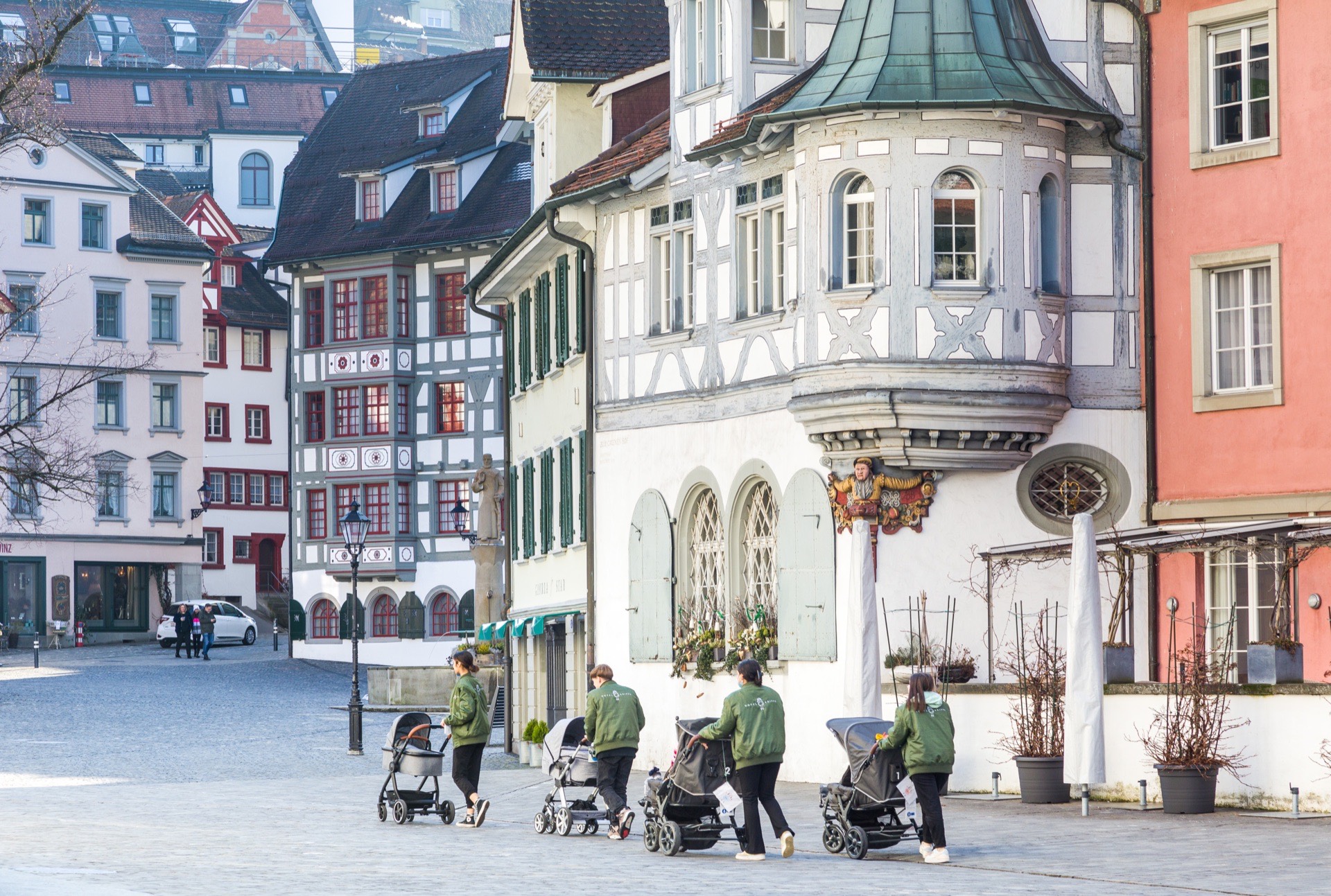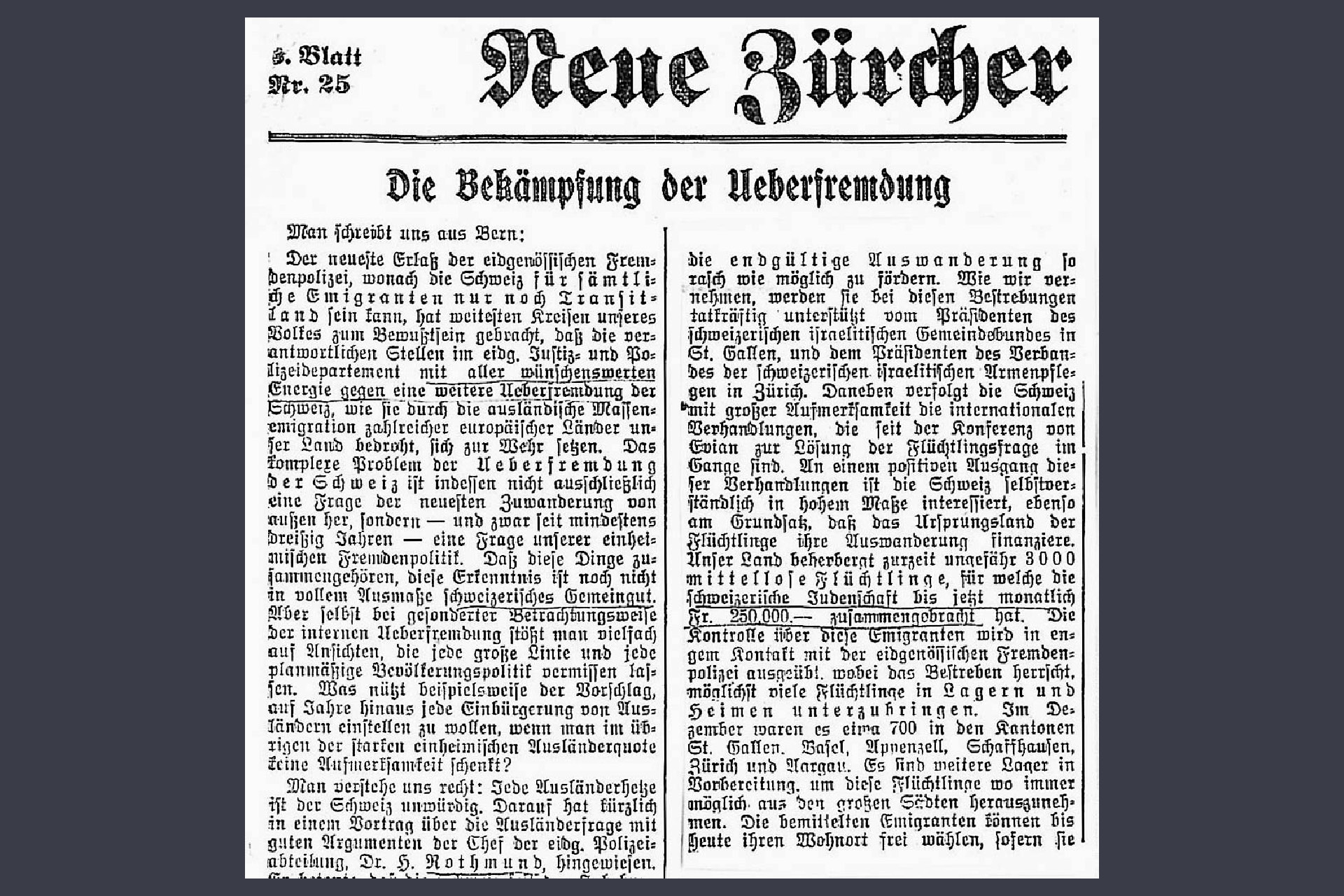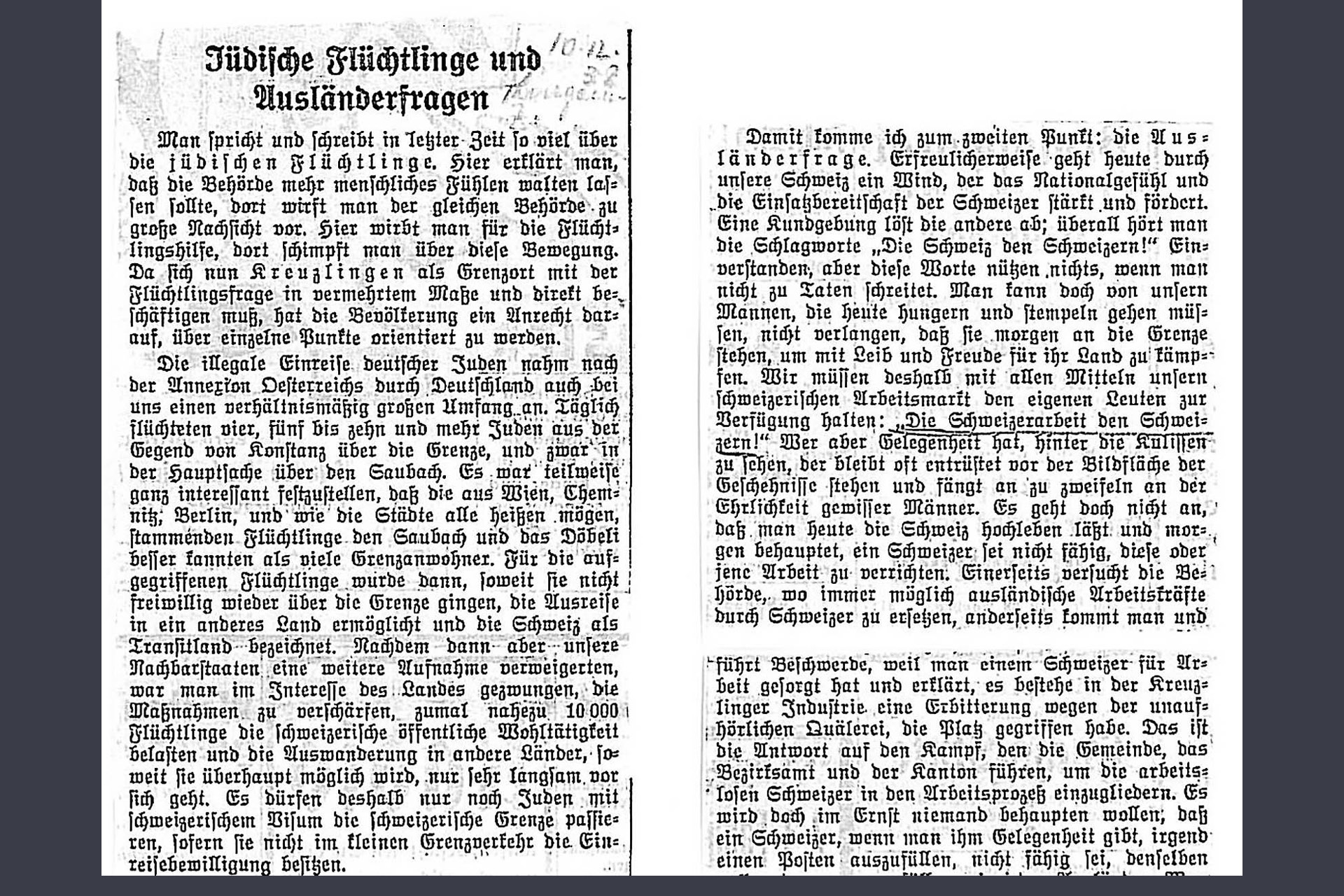Switzerland for the Swiss> 1938 - 1942
8 "Switzerland for the Swiss“
“Switzerland for the Swiss”. Leaflets agitate, newspapers report and the head of the Foreigners' Police has his thoughts. 1938 to 1942
August 29, 1938, St. Gall
Anti-Semitic leaflets from the “National Front” are distributed in St. Gall. They warn of the “flooding of eastern Switzerland with Jewish emigrants”.
“In the past few days hundreds and hundreds of Jews from Austria have crossed our border, the majority of them taking up quarters in St. Gall. Even the newspapers of the system found this influx 'uncomfortable'. ... They do not know that we can only protect ourselves from Jewish influences and machinations if we recognize in the Jew an alien race, totally different from us, which, thanks to its education by the Talmud, is equipped with quite different 'moral' standards than we Christian Swiss. ... Switzerland to the Swiss!”[1]
December 10, 1938, Kreuzlingen
In the Thurgauer Zeitung, district governor Otto Raggenbaß complains about the entry of illegal Jewish refugees from Constance to Kreuzlingen.
“It was sometimes quite interesting to note that the refugees coming from Vienna, Chemnitz, Berlin, and whatever the cities might be called, knew the Saubach and the Döbele better than many border residents. ... It is often difficult, in view of the existing facts, to expel people and put them across the border; but it is the sacred duty of the authorities to protect the country and the people from the serious dangers of over-alienation and the anti-Semitic movement.”
District governor Raggenbaß goes on to address the so-called “foreigner question” and complains that the slogan “Swiss work for the Swiss!” is not being given substance. Many of the jobs offered would not be accepted by Swiss nationals because they were too heavy.
“We must get to the point where every company is proud to employ only Swiss labor.”[2]
January 30, 1939, Zurich
The Neue Zürcher Zeitung is devoted to Swiss “alien policy” under the headline:
“The latest decree of the Federal Aliens Police, according to which Switzerland can only be a transit country for all emigrants, has made the widest circles of our people aware that the responsible offices in the Federal Department of Justice and Police are defending themselves with all desirable energy against a further over-alienation of Switzerland, such as threatens our country through foreign mass emigration of numerous European countries. (...) However, the fight against excessive alienation requires not only a purposeful naturalization policy but also (...) a strict alien police practice, both towards emigrants and towards foreigners seeking work. (...)”[3]
October/November 1942
On October 12, 1942, the head of the refugee police in the Federal Department of Justice and Police, Heinrich Rothmund, travels to Germany. Among other things, he visits the Sachsenhausen concentration camp there. After his return in November, he reports to the Federal Council. He speaks of “efficient allowances, good bread and tasty sausages” that the hard workers among the prisoners would receive and tells of a meeting with German officials and the SS in the camp.
“At lunch, the casual conversation resulted in an opportunity to go over the Jewish question. I tried to make it clear to the gentlemen that the people and authorities in Switzerland had always clearly recognized the danger of Judaization and had always resisted it in such a way that the disadvantages of the Jewish population were offset by the advantages, whereas this was not the case in Germany. (...) The Jewish race is historically tested, tough and strong in the face of persecution. It has so far withstood all attempts at extermination and has always emerged stronger. From these considerations, I concluded my remarks, the German method seems to me to be wrong and dangerous for all of us, because it ultimately hunts the Jews down.”[4]
[1] Thomas Metzger, Antisemitismus in der Stadt St. Gallen 1918-1939. Fribourg 2006, p. 356.
[2] Thurgauer Zeitung, 10.12.1938.
[3] Neue Zürcher Zeitung, 30.1.1939.
[4] Diplomatic Documents of Switzerland 1848-1945, Bern 1997, Vol. 14 (1941-1943), p. 862.
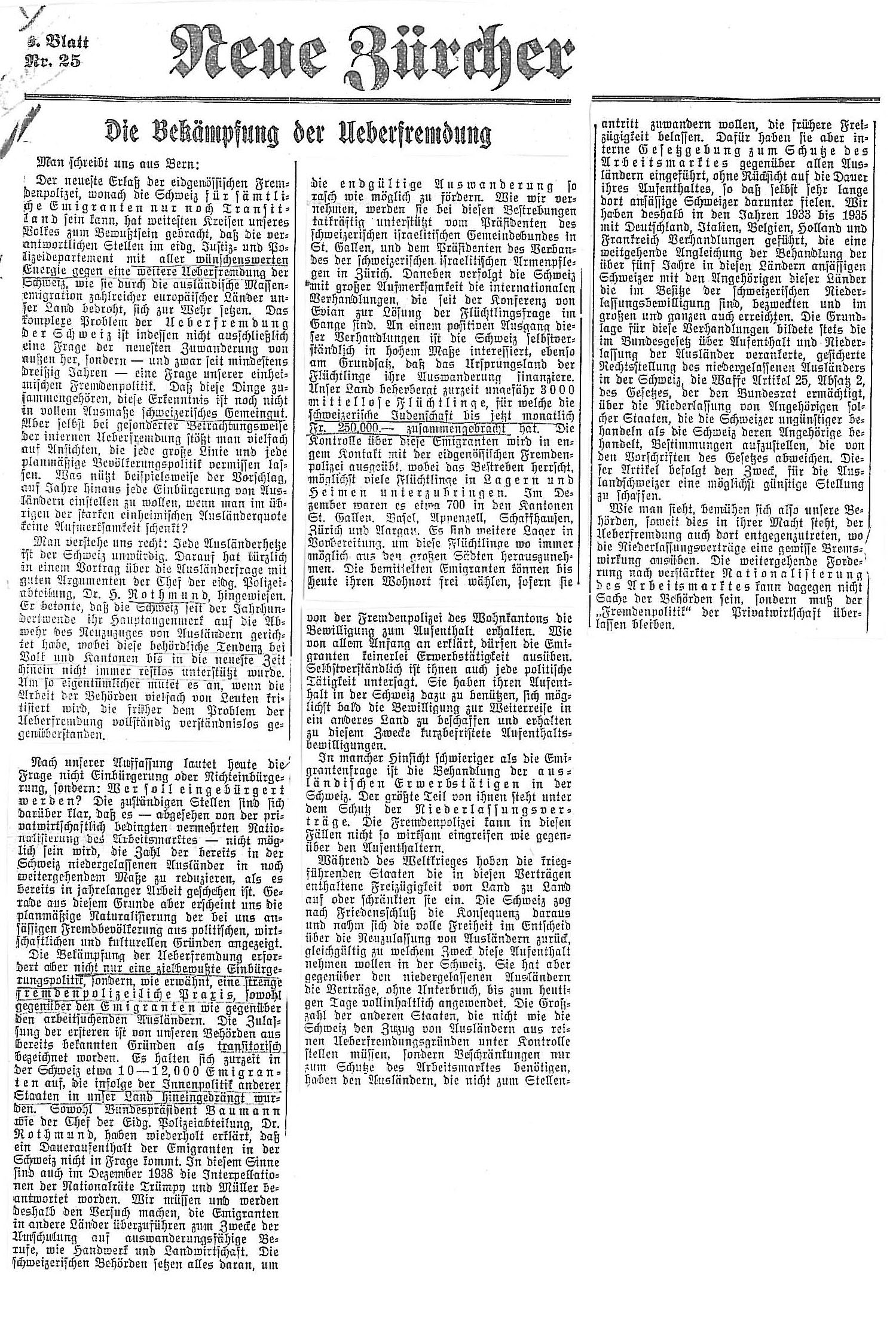
Neue Zürcher Zeitung, January 30, 1939
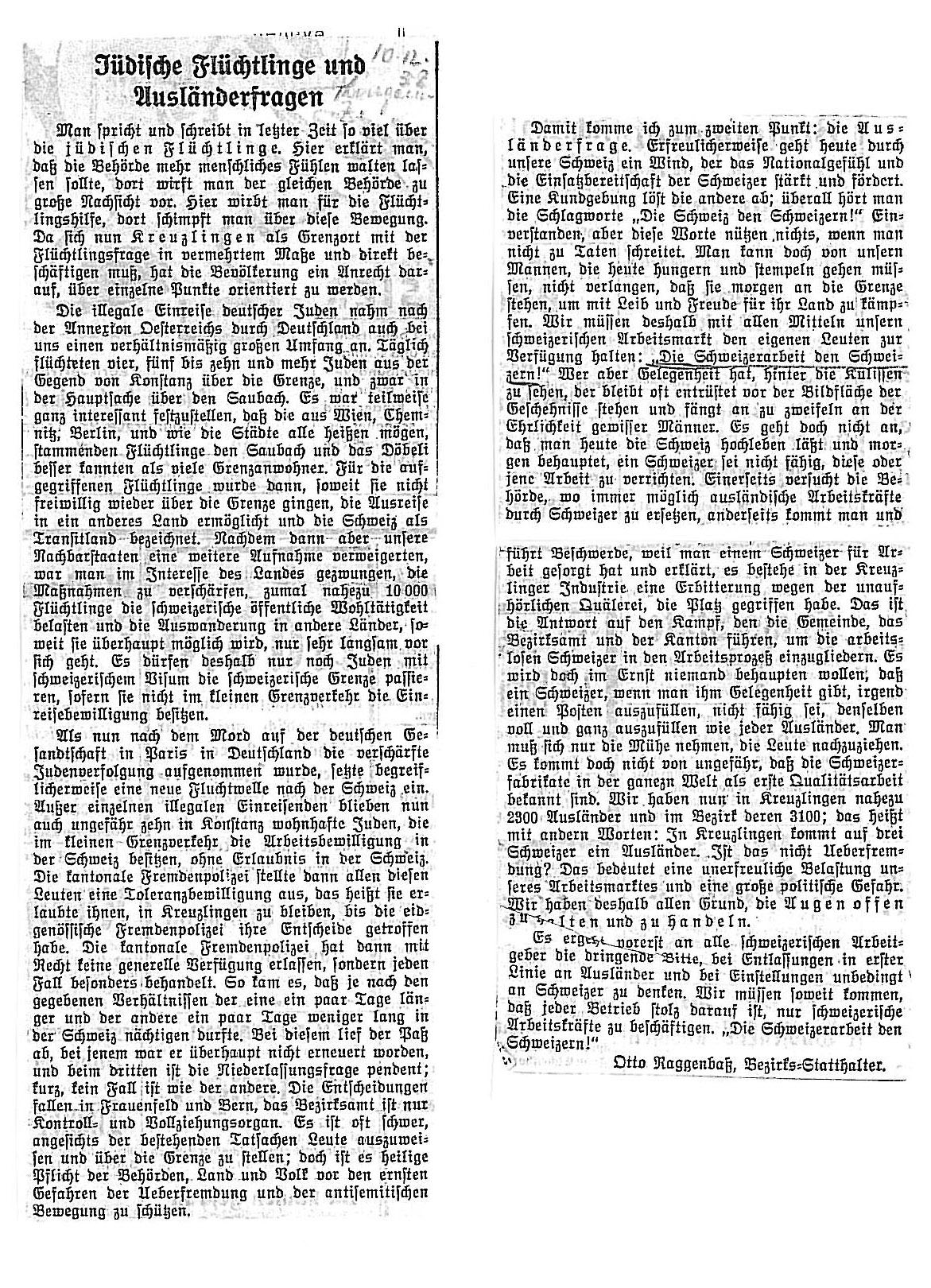
Thurgauer Zeitung, December 10, 1938
8 "Switzerland for the Swiss“
“Switzerland for the Swiss”. Leaflets agitate, newspapers report and the head of the Foreigners' Police has his thoughts. 1938 to 1942
August 29, 1938, St. Gall
Anti-Semitic leaflets from the “National Front” are distributed in St. Gall. They warn of the “flooding of eastern Switzerland with Jewish emigrants”.
“In the past few days hundreds and hundreds of Jews from Austria have crossed our border, the majority of them taking up quarters in St. Gall. Even the newspapers of the system found this influx 'uncomfortable'. ... They do not know that we can only protect ourselves from Jewish influences and machinations if we recognize in the Jew an alien race, totally different from us, which, thanks to its education by the Talmud, is equipped with quite different 'moral' standards than we Christian Swiss. ... Switzerland to the Swiss!”[1]
December 10, 1938, Kreuzlingen
In the Thurgauer Zeitung, district governor Otto Raggenbaß complains about the entry of illegal Jewish refugees from Constance to Kreuzlingen.
“It was sometimes quite interesting to note that the refugees coming from Vienna, Chemnitz, Berlin, and whatever the cities might be called, knew the Saubach and the Döbele better than many border residents. ... It is often difficult, in view of the existing facts, to expel people and put them across the border; but it is the sacred duty of the authorities to protect the country and the people from the serious dangers of over-alienation and the anti-Semitic movement.”
District governor Raggenbaß goes on to address the so-called “foreigner question” and complains that the slogan “Swiss work for the Swiss!” is not being given substance. Many of the jobs offered would not be accepted by Swiss nationals because they were too heavy.
“We must get to the point where every company is proud to employ only Swiss labor.”[2]
January 30, 1939, Zurich
The Neue Zürcher Zeitung is devoted to Swiss “alien policy” under the headline:
“The latest decree of the Federal Aliens Police, according to which Switzerland can only be a transit country for all emigrants, has made the widest circles of our people aware that the responsible offices in the Federal Department of Justice and Police are defending themselves with all desirable energy against a further over-alienation of Switzerland, such as threatens our country through foreign mass emigration of numerous European countries. (...) However, the fight against excessive alienation requires not only a purposeful naturalization policy but also (...) a strict alien police practice, both towards emigrants and towards foreigners seeking work. (...)”[3]
October/November 1942
On October 12, 1942, the head of the refugee police in the Federal Department of Justice and Police, Heinrich Rothmund, travels to Germany. Among other things, he visits the Sachsenhausen concentration camp there. After his return in November, he reports to the Federal Council. He speaks of “efficient allowances, good bread and tasty sausages” that the hard workers among the prisoners would receive and tells of a meeting with German officials and the SS in the camp.
“At lunch, the casual conversation resulted in an opportunity to go over the Jewish question. I tried to make it clear to the gentlemen that the people and authorities in Switzerland had always clearly recognized the danger of Judaization and had always resisted it in such a way that the disadvantages of the Jewish population were offset by the advantages, whereas this was not the case in Germany. (...) The Jewish race is historically tested, tough and strong in the face of persecution. It has so far withstood all attempts at extermination and has always emerged stronger. From these considerations, I concluded my remarks, the German method seems to me to be wrong and dangerous for all of us, because it ultimately hunts the Jews down.”[4]
[1] Thomas Metzger, Antisemitismus in der Stadt St. Gallen 1918-1939. Fribourg 2006, p. 356.
[2] Thurgauer Zeitung, 10.12.1938.
[3] Neue Zürcher Zeitung, 30.1.1939.
[4] Diplomatic Documents of Switzerland 1848-1945, Bern 1997, Vol. 14 (1941-1943), p. 862.

Neue Zürcher Zeitung, January 30, 1939


